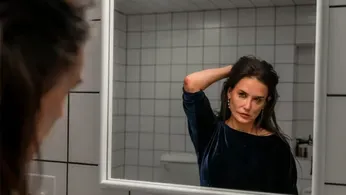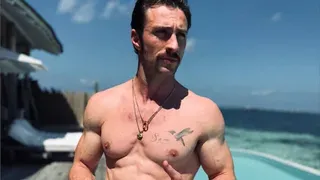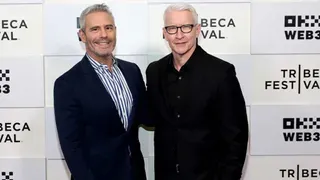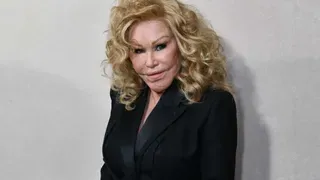
September 16, 2024
Review: 'The Substance' is a Satire That's as Shallow as Its Target
C.J. Prince READ TIME: 3 MIN.
In the opening scenes of "The Substance," writer/director Coralie Fargeat makes her film's one major point in an overlong and repetitive sequence: an overhead shot of workers on a sidewalk reveals they're installing a star on the Hollywood Walk of Fame for actress Elisabeth Sparkle (Demi Moore, clearly having a fun time with her role). The scene begins jumping ahead through time, signified by signs of the season passing, like fall leaves blowing around (do those trees even grow in that area of Hollywood?) and snow covering the ground (does it snow that much in Hollywood?). People stop to take pictures with the star at first, but as time marches on it fades and cracks while people ignore it altogether.
Do you get the point? If not, it's fine, since Fargeat has ample opportunity to state it again over the nearly two-and-a-half-hour runtime. We see Elisabeth at work as the host of a fitness TV show, ready to celebrate her 50th birthday until she's unceremoniously fired by her chauvinistic network executive boss Harvey (Dennis Quaid) for being too old. Distraught over the inevitability that her age is making her unemployable, Elisabeth thinks her career is over until someone introduces her to a product called The Substance.
What is The Substance? It's a neon green liquid you inject yourself with that causes your DNA to generate a second version of yourself, one that's supposed to be younger and more beautiful. But this substance comes with a set of strict rules that must be followed: Your consciousness gets shared between both bodies; you can only inhabit one body at a time; and you can't spend longer than one week inside one before you have to switch over. As the smooth-voiced representative for The Substance states (and the film restates), you must respect the balance and never forget that "you are one."
Fargeat and cinematographer Benjamin Kracun cover everything in a stylish, candy-coated, glossy layer that makes the visuals pop, while giving the film enough leeway to set itself in an alternate reality from ours. That allows "The Substance" to function as a satire, even if it's not very good at satirizing its target. There's an obvious irony to the title that Fargeat leans into, a bit of self-awareness that's supposed to inform all of the shallow indulgences on screen. This is a film designed to be from the perspective of a woman who must navigate a world where her looks dictate her usefulness, and that pressure causes her to take extreme measures to stay useful.
Fargeat uses the cheeky self-awareness as a pass to be as obnoxious as she wants in order to make her point, like how every man Elisabeth meets comes across as a gross boor or pathetic loser. It's one thing to have Dennis Quaid's character act like a chauvinistic jackass, but when he's named Harvey, speaks in nothing but the most degrading terms about women, and almost every shot of him is in a grotesque, distorted close-up, it gets to be a bit much. (You could replace every one of Quaid's lines with "ooga booga," and you wouldn't lose anything.) The same goes for Fargeat's deliberately male-gaze direction, with the camera lingering on Sue's breasts and ass, and her TV show being a thin excuse to show off thrusting women's bodies.
In other words, "The Substance" is a feminist fable that's told by a filmmaker with the instincts of a 12-year-old boy.
"The Substance" opens in theaters Sept. 20.







